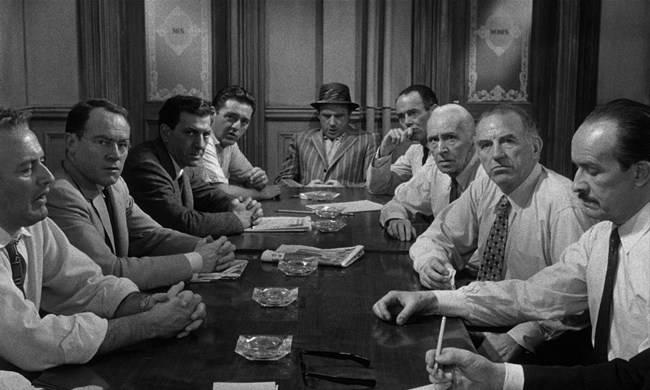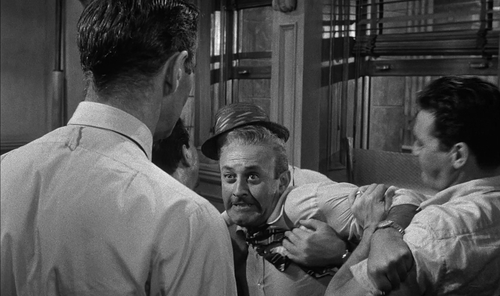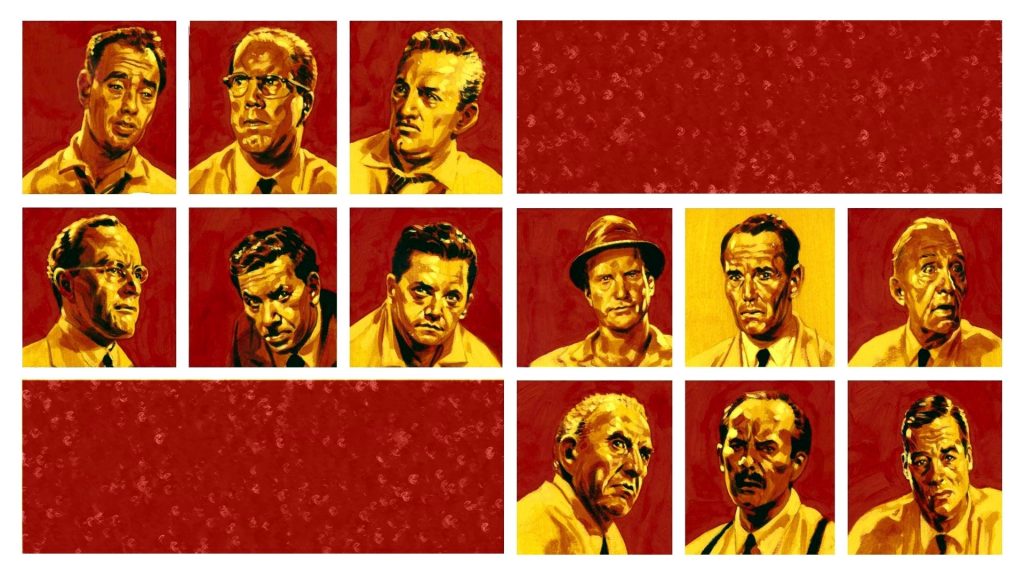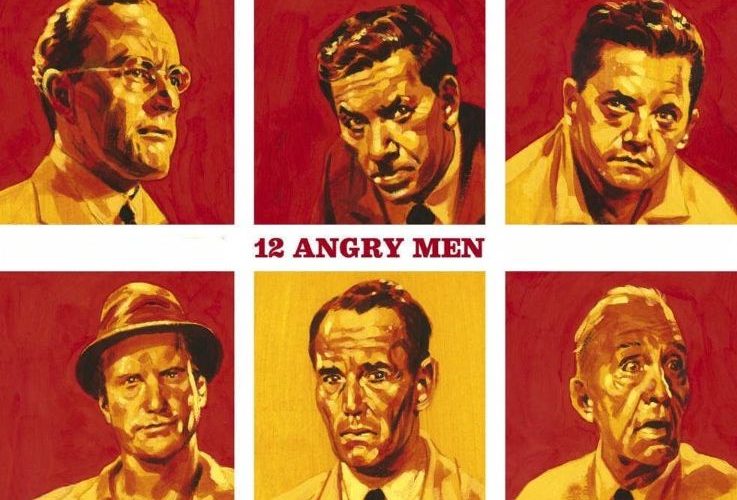12 Angry Men (1957) – On trial 60 years on.
“Prejudice Always Obscures The Truth.”
Yet another classic film to reach an important milestone in 2017, one that is regarded as one of the greatest ensemble pieces ever committed to celluloid, 12 Angry Men, turns 60 this year. Based on Reginald Rose’s teleplay script of the same name, 12 Angry Men was the 1957 theatrical directorial debut of Sidney Lumet. Lumet would go on to have a long career that brought classics such as Serpico, Dog Day Afternoon and Network. His debut feature’s simple plot involves an all-male jury discussing the guilt or innocence of a young man on trial for the murder of his father before ultimately reaching a verdict. And that’s it. For 96 minutes.
Don’t be put off though as 12 Angry Men is a ruthlessly efficient and perfectly crafted film and is absolutely worthy of its position on the IMDB Top 250 (at time of writing it sits at No. 5). The simplicity of the plot allows for a full appreciation of its strong script and performances. At the heart of the film is Henry Fonda’s Juror No.8 who, out of the 12, is the only one who isn’t convinced of the defendant’s guilt and is met by the derision of some of the more headstrong jurors who are absolutely convinced that the young man, who is of an undisclosed non-Caucasian ethnicity, is guilty.

Initially No. 8 can’t pinpoint the exact reasoning behind his doubt but as he begins to vocally analyse each facet of the initially damning evidence he begins to slowly but surely highlight the fact that the man’s guilt is anything but proven. No.8 has a strong moral compass and a very grounded level of common sense that allows him to look at the case objectively and without bias or prejudice. It’s the film’s focus on the prejudice of some of the remaining jurors, prejudice any one of us could be prone to, that forms the larger part of the film’s message. This prejudice comes in many forms and the boy is not only judged on the evidence against him but also according to his race, age, class and where he lives. It is down to No. 8 to cast a magnifying glass not just on the evidence but on his counterparts who aren’t looking at the case with the same degree of objectivity. Some of the jurors are fairly easily swayed having never been that convinced in the first place but others, such as Lee J. Cobb’s 3, and Jack Warden’s 7 are particularly stubborn. No.7’s main concern being that he wants to get a quick verdict in so he can see a baseball game later that night.
The way that some of the more damning evidential aspects of the case are turned on their heads makes for compelling and satisfying viewing. The revelation as to the ubiquity of the supposedly unique murder weapon is one such reveal and shows that No. 8 is fully invested in giving the man a fair trial. As is often brought up by the more level headed jurors, this deliberation is about the life of a man who may be innocent and who, if found guilty, will be sentenced to death and so cannot be dealt with as a trivial matter.

The film explores the true burden of responsibility placed upon regular men and women when given such a task. It’s easy to empathise with the rationale of many of the jurors who initially believe the man to be guilty and this makes 8’s job all the more harder in order to unravel the web of “facts” to get to the truth. The thing that 8 is most aware of is the fact that they have to not just prove his guilt but to prove it beyond reasonable doubt and the way in which he systematically addresses the weaknesses of the case is superbly and believably handled. Fonda’s performance not only anchors the film but is also a career best in a career full of incredible performances.
The direction is very much like that of a stage play which is appropriate given 12 Angry Men‘s teleplay origins. At first the camera is set high, looking down on proceedings with a certain detachment but as things wear on and the tension and claustrophobia increase in the hot and enclosed room, the camera slowly moves in closer on our protagonists to the point where, by the final act, the camera is looking up at the faces of our sweaty jurors. The framing of the film and its use of clever shot composition by director of photography Boris Kaufman heightens the sense of claustrophobia.
The film’s own continuity is also carefully considered. You can actually see the sweat marks on the jurors shirts increasing in size as time goes on. This sense of verisimilitude adds immeasurably to the film, it’s sense of claustrophobia and that of the ever ticking clock pressing the men to turn in a verdict. The pacing of Carl Lerner’s editing highlights this pressure the jury are under and adds to the growing feeling of tension.

To go into any more detail would spoil the film for those who haven’t seen it. The film’s message of tolerance is never played with too heavy a hand and the restraint of many of the actors is commendable. In a taught, almost realtime dramatisation such as this it would be easy to ham it up so as to be seen as the stronger player but the superb ensemble of respected character actors never seem prone to upstaging one other. That said Fonda’s performance is the one that stands out, possibly due in some part to him being the most recognisable of the cast, but he truly delivers here on all fronts.
When a film is as restricted as this in respect of its confinement to the one location and consisting purely of men talking (and often shouting) to one another it highlights the strengths of the script and performances in that my attention never waned throughout. It certainly isn’t as visually arresting as more conventional dramas due to the very restrictions that define a film with such strong stage play origins, but under Lumet’s assured direction 12 Angry Men is nevertheless a masterclass in filmmaking distilled to its base ingredients. The verdict… an all-time classic and still every bit as good six decades on.
Film ’89 Verdict – 10/10
12 Angry Men is available on Blu-Ray in the UK and US courtesy of The Criterion Collection.


